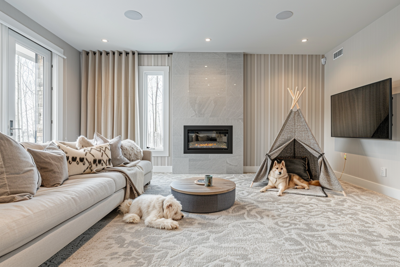
Owning pets brings immense joy and companionship but also adds various challenges, particularly in maintaining a clean household. One significant aspect of cleanliness involves keeping carpets free from fur, dander, dirt, and other debris that pets contribute. The obvious solution for cleaning households is investing in vacuum cleaners.
However, another commonly asked question among pet owners is, "How often should I vacuum my carpet when I have pets?" In this article, we will delve into the factors influencing how frequently you should vacuum, offering practical advice to achieve the best results for both your carpets and pets.
Understanding the Challenges of Having Pets in Your Home
The presence of pets introduces unique cleaning challenges that go beyond everyday dust and dirt. With their fur shedding, risk of accidents, and tendency to bring outdoor elements inside, maintaining tidy carpets becomes paramount. Some key challenges include:
- Pet hair accumulation, which can embed deeply into carpet fibers
- Dander, a common allergen that pets shed along with skin flakes
- Dirt and mud brought indoors on paws
- Accidents or spills that can lead to stains and odors
To tackle these issues effectively, considering your vacuuming frequency is essential.
Pet Hair and Dander: A Unique Challenge
Pet hair and dander are two primary concerns for any pet owner. Hair tends to get trapped within carpet fibers, making it tough to remove with just regular sweeping or light vacuuming. Pet dander comprises tiny flecks of skin, contributing significantly to allergies.
A good rule of thumb is to vacuum high-traffic areas at least every other day if you have one or more furry friends. This frequent attention helps capture loose hair and dander before they become embedded in the carpet, reducing allergens in your household.
Mud, Dirt, and Outdoor Debris
Pets with outdoor access frequently track in dirt and mud. These elements not only sully the appearance of your carpets but can sometimes harbor bacteria. It's advisable to set up designated wiping areas at entry points where you can clean your pets' paws as they come in. Despite such preventive measures, you'll likely still find grimy residues that necessitate extra vacuuming sessions, especially during wet weather seasons.
Vacuuming Frequency Based on Pet Types and Habits
Different types of pets and their individual habits play a significant role in determining your vacuuming schedule. The kind of pet you have and its behavior pattern will dictate how rigorous your cleaning efforts should be.
If you're uncertain about specific vacuuming needs tailored to varied pet conditions, feel free to discover Dyson's selection of cordless vacuums suited to handle multiple situations effortlessly.
Dogs vs Cats
Both dogs and cats shed hair, but dogs generally bring additional troubles like mud and larger amounts of dander. If you've got a dog, daily vacuuming may be more appropriate, focusing on the areas they frequent most, such as living rooms or bedrooms. Cats tend to confine themselves to fewer spaces and their litter boxes, so you might aim for a thorough cleanup every three days.
Long-Haired vs Short-Haired Breeds
The breed of your pet further influences cleaning needs. Long-haired breeds release more hair and need higher frequency vacuuming compared to short-haired ones. Additionally, periodic grooming sessions can lessen indoor shedding, thereby easing your cleaning load.
Utilizing Specialized Vacuums for Pet Households
A variety of vacuum models cater specifically to homes with pets, equipped with features like strong suction power, filtration systems, and attachments designed to pick up pet hair. Selecting the right vacuum ensures better efficiency and cleaner carpets, providing a healthier environment for both humans and pets.
Handheld Vacuums for Quick Cleanups
These compact devices are ideal for rapid spot cleaning, addressing unexpected messes without dragging out a full-sized machine. Handheld vacuums are extremely helpful for small areas, stairs, or upholstery—places where pets love to lounge.
Filtration Systems
Good quality vacuum filters are crucial in managing pet-related allergens. HEPA filtration systems can capture minute dirt and dander particles. Using a vacuum with efficient filtration mechanisms can potentially contribute to cleaner air quality, thus creating a healthier living space.
Additional Strategies for Effective Carpet Cleaning
While frequent vacuuming makes a significant difference, a few additional strategies can complement your efforts to maintain pristine carpets.
Routine Grooming of Pets
By regularly grooming your pets, you can catch much of the loose fur before it hits the floor. Regular baths and brushing sessions reduce shedding, resulting in less hair on your carpets.
Using Area Rugs and Mats
Area rugs and mats strategically placed in high-traffic zones can trap dirt before it settles into carpets. They also offer an easily washable alternative to deep carpet cleaning.
Chemical-Free Cleaning Solutions
For spot cleaning stubborn stains or dealing with accidents, rely on eco-friendly products that are pet-safe. Avoid harsh chemicals which can be harmful to pets’ skin and health.
Final Thoughts on Maintaining Clean Carpets with Pets
Mastering the art of keeping carpets clean with pets around involves a dedicated approach combining routine grooming, strategic vacuuming, and investing in suitable cleaning tools. While it's a consistent effort, the reward of a cleaner home environment is worth it for both human and animal family members. By adhering to the recommendations outlined, you can ensure a hygienic and cozy living space for everyone involved.
Here are some other articles related to your search:


(0) comments
We welcome your comments
Log In
Post a comment as Guest
Keep it Clean. Please avoid obscene, vulgar, lewd, racist or sexually-oriented language.
PLEASE TURN OFF YOUR CAPS LOCK.
Don't Threaten. Threats of harming another person will not be tolerated.
Be Truthful. Don't knowingly lie about anyone or anything.
Be Nice. No racism, sexism or any sort of -ism that is degrading to another person.
Be Proactive. Use the 'Report' link on each comment to let us know of abusive posts.
Share with Us. We'd love to hear eyewitness accounts, the history behind an article.